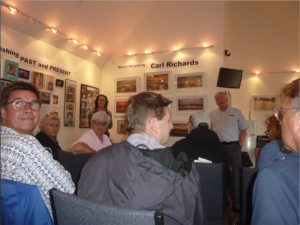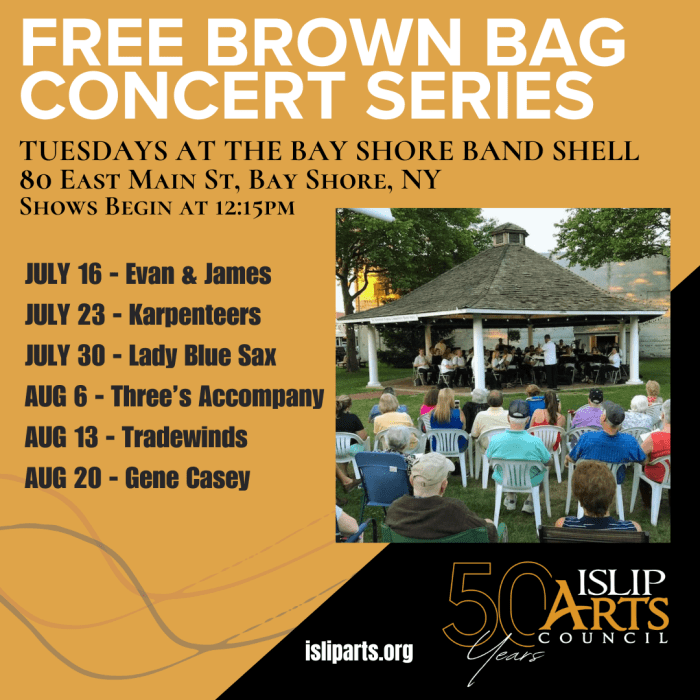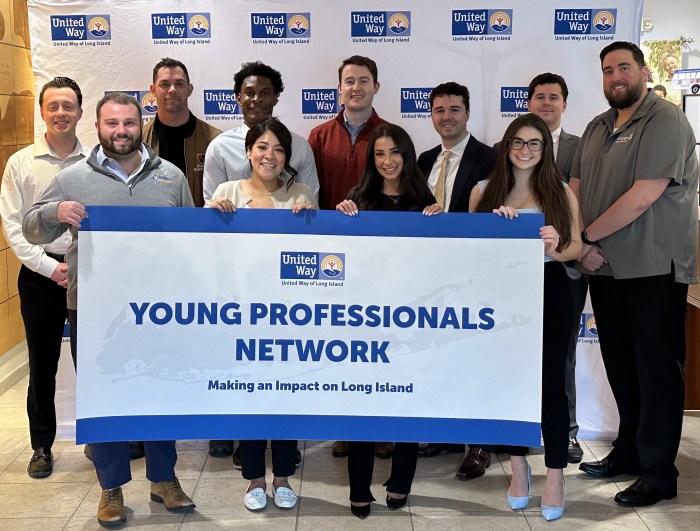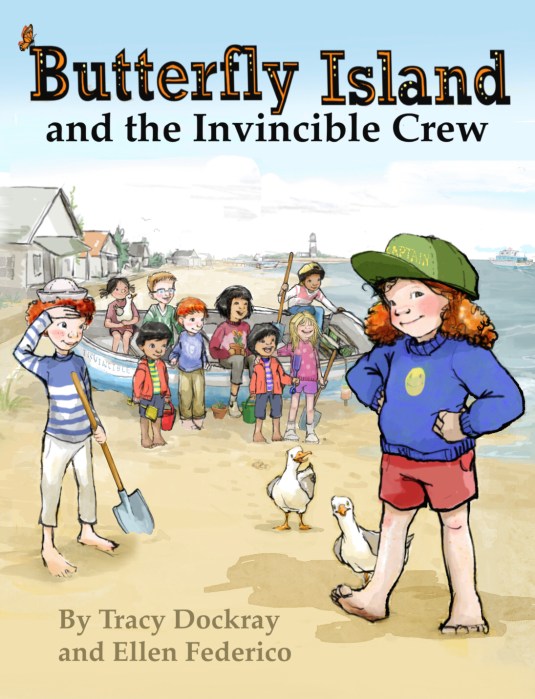By Shoshanna McCollum On a gray Saturday afternoon on June 23, individuals from every corner of Fire Island quietly filed into the Ocean Beach Historical Society. The meeting was by invitation only, extended to the keepers of repositories on this island that are like beads on a string: Point O’ Woods Archives, Fire Island Pines Historical Society, Cherry Grove Archives Collection, Ocean Beach Historical Society, as well as representatives from Water Island, Ocean Bay Park, even folks wearing ranger hats from Fire Island National Seashore (FINS) itself.“I speak to you today not as a leader, but a participant,” said Fire Island Association (FIA) President Suzanne Goldhirsch. “This is a challenge where all key participants are starting from zero.”At that time Goldhirsch introduced Dr. Gregory Hunter of the Palmer School of Library and Information Science, at Long Island University (LIU) Post. (Formerly known as C.W. Post, in Brookville.) As Hunter explained, not long ago the Palmer School at LIU Post become a recipient of a $1.5 million grant from the Robert David Lion Gardiner Foundation to digitize materials in local historical societies across Long Island over a five-year period. In the first year of the project, 26 historical societies in Nassau and Suffolk counties were accepted into the program. They are looking to expand that number to 80 in total by 2022. This meeting was an exploratory one to see if the Fire Island historical societies, either collectively or as a whole, would be a good fit for the program.It’s no secret that small historical societies across Long Island are often struggling organizations. They have the will and desire to collect but not necessarily preserve their history. Photographs, ledger books, and memorabilia are among the items that can tell the story of a given community. Storage conditions within said historical societies can leave much to be desired, and said items are vulnerable to the ravages of time. Add existence on a barrier island to that equation and those concerns are tenfold.The LIU project has two modalities. Digitization can be performed on-site at the historical society, or materials can be brought to the campus. Master’s and Ph.D. students of library sciences perform the work as part of a credit internship, equipped with stateof- the-art scanning equipment – needless to say we are not talking about some home office printer/scanner that huffs, puffs, and runs out of ink all the time – all at no cost to these often cashstrapped modest organizations.All of what Hunter described sounded like a pretty sweet deal, however there were questions that needed to be asked, which was what this gathering was all about. One of the larger questions out there was who in this room qualifies for the program?This publication recently got its own archive back after many years. (See our June 8 article “FIN Archives Acquired.”) However FIN would not qualify for participation because the institution in question has to be an IRS recognized charity organization known as a 501 (c) 3. Fire Island News is a commercial business. Several organizations represented in the room have 501 (c) 3 status already, but not all of them. Some like Cherry Groves Archives Collection, which had been functioning as a loose collective, had the foresight to partner with Cherry Grove Arts Project, which already had this tax-exempt status, so they might benefit under the same proverbial umbrella.Beloved CJ’s bartender Jimmy Engle, who sat in on the meeting because he has built his own impressive Fire Island collection of postcard and memorabilia over the years, also would not qualify because he is a private collector. Engle would have to relinquish ownership of his collection to a 501 (c) 3 in order to participate in the project, something he did not seem terribly eager to do. Even if he did, there is no guarantee his vintage postcards would make it to that high-powered scanner. The LIU project is designed to sample highlights of a collection.“No one is going to get everything on their Christmas list,” Hunter said.Ocean Beach Association President Maria Silsdorf, the coordinator of this meeting, affirmed Hunter’s statement on the importance of “prioritizing.” Goldhirsch then added that even FIA would not qualify, because although they are tax exempt, they are what is known as a 501 (c) 4 organization, a subtle but important difference. As a federal agency, the park rangers in attendance knew their archival holdings may not qualify for this program. However the updated FINS General Management Plan contains expanded language about reconciling the unique cultural aspects of the Fire Island communities. Their reasons and interest for being there were legitimate.Questions then shifted to proprietary rights. Once they are digitized, collections would be uploaded to a cloud site known as Preservica. Once on that cloud site, would treasured images become public domain? Hunter assured the audience that need not be the case. Once uploaded, historical societies maintain control whether the images are public or open to a limited audience.Then questions shifted to intellectual property. Just because a print of a photograph ends up in a collection it does not mean the institution has rights to the image. The iconic photograph of Dr. Martin Luther King riding a bicycle in Seaview is a classic local example. The image is now ubiquitous on social media, but Stan Wolfson, a longtime staff photographer at Newsday, took the original photograph – together they jointly own the copyright.While the meeting raised perhaps more questions than it could answer, this grant still presents a valuable opportunity to small historical societies – unlike libraries or local governments in New York that have robust funding venues at their disposal, small institutions like the ones represented that day often have few options beyond private donations.What was apparent was that with only 80 slots to be filled by 2022 on Long Island, the seven or eight small groups in that room will have to work together if they are to earn this chance to save history on Fire Island.
On a gray Saturday afternoon on June 23, individuals from every corner of Fire Island quietly filed into the Ocean Beach Historical Society. The meeting was by invitation only, extended to the keepers of repositories on this island that are like beads on a string: Point O’ Woods Archives, Fire Island Pines Historical Society, Cherry Grove Archives Collection, Ocean Beach Historical Society, as well as representatives from Water Island, Ocean Bay Park, even folks wearing ranger hats from Fire Island National Seashore (FINS) itself.“I speak to you today not as a leader, but a participant,” said Fire Island Association (FIA) President Suzanne Goldhirsch. “This is a challenge where all key participants are starting from zero.”At that time Goldhirsch introduced Dr. Gregory Hunter of the Palmer School of Library and Information Science, at Long Island University (LIU) Post. (Formerly known as C.W. Post, in Brookville.) As Hunter explained, not long ago the Palmer School at LIU Post become a recipient of a $1.5 million grant from the Robert David Lion Gardiner Foundation to digitize materials in local historical societies across Long Island over a five-year period. In the first year of the project, 26 historical societies in Nassau and Suffolk counties were accepted into the program. They are looking to expand that number to 80 in total by 2022. This meeting was an exploratory one to see if the Fire Island historical societies, either collectively or as a whole, would be a good fit for the program.It’s no secret that small historical societies across Long Island are often struggling organizations. They have the will and desire to collect but not necessarily preserve their history. Photographs, ledger books, and memorabilia are among the items that can tell the story of a given community. Storage conditions within said historical societies can leave much to be desired, and said items are vulnerable to the ravages of time. Add existence on a barrier island to that equation and those concerns are tenfold.The LIU project has two modalities. Digitization can be performed on-site at the historical society, or materials can be brought to the campus. Master’s and Ph.D. students of library sciences perform the work as part of a credit internship, equipped with stateof- the-art scanning equipment – needless to say we are not talking about some home office printer/scanner that huffs, puffs, and runs out of ink all the time – all at no cost to these often cashstrapped modest organizations.All of what Hunter described sounded like a pretty sweet deal, however there were questions that needed to be asked, which was what this gathering was all about. One of the larger questions out there was who in this room qualifies for the program?This publication recently got its own archive back after many years. (See our June 8 article “FIN Archives Acquired.”) However FIN would not qualify for participation because the institution in question has to be an IRS recognized charity organization known as a 501 (c) 3. Fire Island News is a commercial business. Several organizations represented in the room have 501 (c) 3 status already, but not all of them. Some like Cherry Groves Archives Collection, which had been functioning as a loose collective, had the foresight to partner with Cherry Grove Arts Project, which already had this tax-exempt status, so they might benefit under the same proverbial umbrella.Beloved CJ’s bartender Jimmy Engle, who sat in on the meeting because he has built his own impressive Fire Island collection of postcard and memorabilia over the years, also would not qualify because he is a private collector. Engle would have to relinquish ownership of his collection to a 501 (c) 3 in order to participate in the project, something he did not seem terribly eager to do. Even if he did, there is no guarantee his vintage postcards would make it to that high-powered scanner. The LIU project is designed to sample highlights of a collection.“No one is going to get everything on their Christmas list,” Hunter said.Ocean Beach Association President Maria Silsdorf, the coordinator of this meeting, affirmed Hunter’s statement on the importance of “prioritizing.” Goldhirsch then added that even FIA would not qualify, because although they are tax exempt, they are what is known as a 501 (c) 4 organization, a subtle but important difference. As a federal agency, the park rangers in attendance knew their archival holdings may not qualify for this program. However the updated FINS General Management Plan contains expanded language about reconciling the unique cultural aspects of the Fire Island communities. Their reasons and interest for being there were legitimate.Questions then shifted to proprietary rights. Once they are digitized, collections would be uploaded to a cloud site known as Preservica. Once on that cloud site, would treasured images become public domain? Hunter assured the audience that need not be the case. Once uploaded, historical societies maintain control whether the images are public or open to a limited audience.Then questions shifted to intellectual property. Just because a print of a photograph ends up in a collection it does not mean the institution has rights to the image. The iconic photograph of Dr. Martin Luther King riding a bicycle in Seaview is a classic local example. The image is now ubiquitous on social media, but Stan Wolfson, a longtime staff photographer at Newsday, took the original photograph – together they jointly own the copyright.While the meeting raised perhaps more questions than it could answer, this grant still presents a valuable opportunity to small historical societies – unlike libraries or local governments in New York that have robust funding venues at their disposal, small institutions like the ones represented that day often have few options beyond private donations.What was apparent was that with only 80 slots to be filled by 2022 on Long Island, the seven or eight small groups in that room will have to work together if they are to earn this chance to save history on Fire Island.































